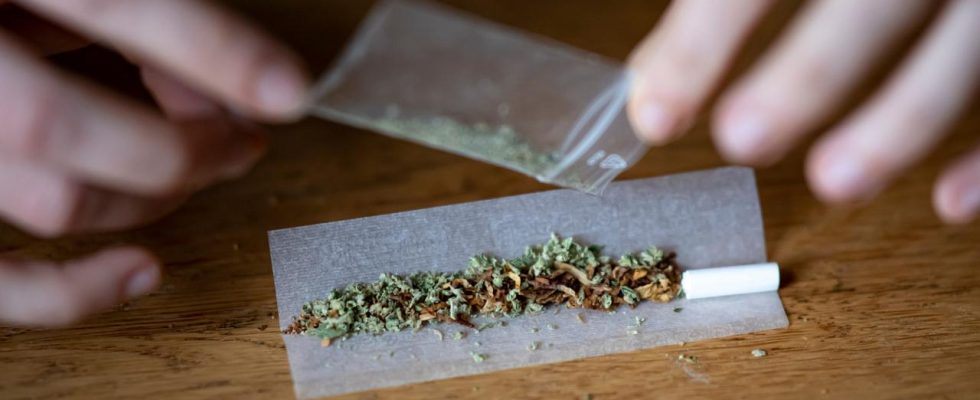The Bundestag has decided to partially legalize cannabis. But it is unclear whether it will actually come into force in April. The Federal Council’s Legal and Interior Committee is discussing a postponement. Where is the problem?
The cannabis community already had lots of ideas: “We discussed a smoke inn,” says Christoph Lehner from the Rhein-Neckar Cannabis Association. Maybe April 20th, for supporters that’s “World Marijuana Day.” Lehner is 57, actually a software developer and has been active in the association for years. He has a registered rally in mind: “You could do it with a countdown – and at zero everyone lights up a joint.” Of course, at a distance from children’s and youth facilities, he adds.
But the party plans will have to wait. It is becoming increasingly likely that partial legalization will not come in April but in October at the earliest. “The nerves are on edge in the hemp community,” says Lehner. “Every day some news, every day something in the news.” There is more and more bad news for stoners: resistance is coming from the states that can still raise objections in the Federal Council at the end of March and call a mediation committee. The justice and interior ministers in particular have been protesting against the plans for weeks.
Committees discuss postponement
This week the Federal Council’s Legal Affairs Committee is meeting today and the Interior Committee is meeting on Thursday. A postponement is being discussed in both committees – and a preliminary decision has probably already been made. Because of the “extremely short preparation time of five weeks” between the Bundestag decision and its entry into force, the judicial authorities would be overloaded, argues an application from Lower Saxony and North Rhine-Westphalia, which is submitted to the ARD capital studio is present. The extra work is “absolutely impossible for public prosecutors, courts and correctional facilities to do.”
The reason: The new impunity also applies retroactively. Everyone who has been convicted of cannabis offenses that will be permitted in the future would have to be released from prison. If someone has committed further crimes, it would have to be re-determined what the overall punishment would be – for example a fine.
The green NRW Justice Minister Benjamin Limbach assumes that there are “several tens of thousands of files” that need to be examined in his state alone. This red-green proposal stipulates that the cannabis law will not come into force until October 1, 2024.
The traffic light strategy
Just postponement, no further substantive discussion – that should now be the traffic light strategy: countries in which they co-govern should, if possible, agree to this narrow proposal in the Legal Affairs Committee on Wednesday. But it is to be expected that a federal state led by the Union will submit a much more far-reaching application.
Bavaria’s Prime Minister Markus Söder (CSU) has already announced that he wants to take part in “everything” that could delay or prevent the law. The most likely scenario is that such a sharp counterproposal will be made in the Federal Council’s Interior Committee on Thursday – the topic is already on the agenda. The Bavarian State Chancellery left a query about this unanswered.
It is unclear why the traffic light groups did not address the states’ concerns earlier. The Green parliamentary group responded that they would have been willing to postpone it “in order to avoid having to refer the matter to the mediation committee.” However, “no agreement could be reached within the coalition”.
Apparently the SPD parliamentary group has blocked this, possibly together with the Federal Health Minister: a later start would “only postpone the additional work that will arise in the transition,” argues Dagmar Schmidt, deputy parliamentary group leader. In addition, the law will likely “lead to relief for the police and judiciary.” The Bundestag could then simply overrule the result of a mediation committee. However, it will probably take a while until that happens.
Traffic light circles also point out that CDU MP Hendrik Hoppenstedt will be chairman of the mediation committee from April. Apparently there is a fear that he is taking his time with the topic. Even the start to October could be shaky. The Green parliamentary group believes that the Union will do everything to stop legalization: Because of the “unfortunately generally increasing tendency to block legislative projects”, they do not expect that the Union will “behave constructively in the Mediation Committee”.
Uncertainty for cannabis clubs
A lot of uncertainty for everyone who wants to smoke joints legally – and organize themselves in a cannabis social club, for example: “The club is hesitant to rent a cultivation hall before the law is actually passed,” says Christoph Lehner, who is involved in “Rising Flowers Heidelberg”. “For a club with a large number of members that wants to produce high-quality products, investments of up to 200 euros are necessary, for example for LED lamps and climate control.” But the scene needs concrete timelines and commitments to find investors. After the start, it takes several months until the harvest is actually usable, says Lehner.
The fact that the date is still unclear may also mean that legal grass will not be available through clubs until much later. In the first few months after partial legalization, the black market would benefit. “It can’t be what politicians want,” says Lehner. He is still considering whether he would grow his own crop: “I would have space for one or two growing tents in the apartment, but the effort is very high.” If things unexpectedly work out on April 1, 2024, Christoph Lehner will definitely want to celebrate with a joint. For him, this is a “day of proportionality,” but also a “liberation,” he says. Maybe he’ll spontaneously register a smoke inn.

